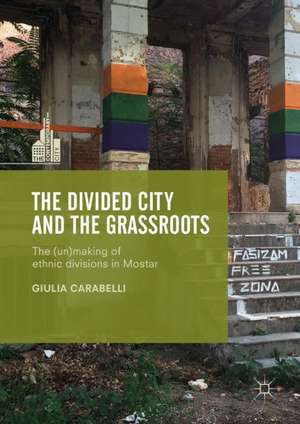The Divided City and the Grassroots: The (Un)making of Ethnic Divisions in Mostar: The Contemporary City
Autor Giulia Carabellien Limba Engleză Hardback – 22 mar 2018
| Toate formatele și edițiile | Preț | Express |
|---|---|---|
| Paperback (1) | 465.15 lei 6-8 săpt. | |
| Springer Nature Singapore – 25 ian 2019 | 465.15 lei 6-8 săpt. | |
| Hardback (1) | 639.73 lei 6-8 săpt. | |
| Springer Nature Singapore – 22 mar 2018 | 639.73 lei 6-8 săpt. |
Preț: 639.73 lei
Preț vechi: 752.63 lei
-15% Nou
Puncte Express: 960
Preț estimativ în valută:
122.43€ • 127.34$ • 101.07£
122.43€ • 127.34$ • 101.07£
Carte tipărită la comandă
Livrare economică 14-28 aprilie
Preluare comenzi: 021 569.72.76
Specificații
ISBN-13: 9789811077777
ISBN-10: 9811077770
Pagini: 154
Ilustrații: XV, 191 p. 11 illus.
Dimensiuni: 148 x 210 mm
Greutate: 0.4 kg
Ediția:1st ed. 2018
Editura: Springer Nature Singapore
Colecția Palgrave Macmillan
Seria The Contemporary City
Locul publicării:Singapore, Singapore
ISBN-10: 9811077770
Pagini: 154
Ilustrații: XV, 191 p. 11 illus.
Dimensiuni: 148 x 210 mm
Greutate: 0.4 kg
Ediția:1st ed. 2018
Editura: Springer Nature Singapore
Colecția Palgrave Macmillan
Seria The Contemporary City
Locul publicării:Singapore, Singapore
Cuprins
Introduction.- Imagining, Planning and Building Mostar after the War.- The Everyday Life of Mostar.- Grassroots Movements and the Production of (other) Space(s).- Conclusion.
Recenzii
“What makes this book stand out in comparison to many other ethnographic and sociological studies on Mostar, is its focus on practices, affects and experiences, rather than on the production of narratives. In so doing, it provides a refreshing perspective. In conclusion, this is a must read for every researcher dealing with Mostar or Bosnia and Herzegovina more broadly. … Most importantly, it offers a sense of movement to the city of Mostar through providing a much-needed and well-deserved agency and a will for a change among its citizens.” (Gustav Wollentz, Space and Polity, November, 2018)
Notă biografică
Giulia Carabelli is a Research Fellow at the Max Planck Institute for the Study of Religious and Ethnic Diversity, Göttingen, Germany. She holds a PhD in Sociology at Queen's University Belfast, a Masters in Research Architecture at Goldsmiths College, London and a BA in History of Islamic Architecture at Ca’Foscari University of Venice. Her research interests lie at the intersection of urban sociology, cultural studies, and political theory. She received the Higginson Leadership Award in 2014.
Textul de pe ultima copertă
Focusing on Mostar, a city in Bosnia Herzegovina that became the epitome of ethnic divisions during the Yugoslav wars, this cutting edge book considers processes of violent partitioning in cities. Providing an in-depth understanding of the social, political, and mundane dynamics that keep cities polarized, it examines the potential that moments of inter-ethnic collaboration hold in re-imaging these cities as other than divided. Against the backdrop of normalised practices of ethnic partitioning, the book studies both ‘planned’ and ‘unplanned’ moments of disruption; it looks at how networks of solidarity come into existence regardless of identity politics as well as the role of organised grassroots groups that attempt to create more inclusive; and it critically engages with urban spaces of resistance. Challenging the representation of the city as merely a site of ethnic divisions, the author also explores the complexities arising from living in a city that validates its citizens solelythrough ethnicity. Elaborating on the relationships between space, culture and social change, this book is a key read for scholars, students, and urban practitioners studying ethnically divided cities worldwide.
Caracteristici
Critically discusses the limits of mainstream representations of Mostar as a site of ethnic hatred Examines complexities arising from living in a city that validates its citizens solely through ethnicity Provides a key contribution to the fields of urban conflict studies and the politics of social movements in the context of socio-cultural segregation










